Literature Review on Mental Health Interventions and Effectiveness
VerifiedAdded on 2023/06/10
|6
|1104
|417
Report
AI Summary
This literature review examines mental health promoting interventions, particularly focusing on interventions aimed at young adults. The review highlights the rising prevalence of mental health disorders and the importance of public health priorities. It explores the effectiveness of school-based and web-based interventions in improving mental health awareness and outcomes, referencing studies that support their positive impact. The review also addresses the limitations of current research, such as the need for increased generalizability, further investigation into web-based interventions, and a deeper understanding of the impact of stigma on help-seeking behavior. The conclusion emphasizes the need for more research to address these gaps and improve the effectiveness of mental health interventions for young adults.
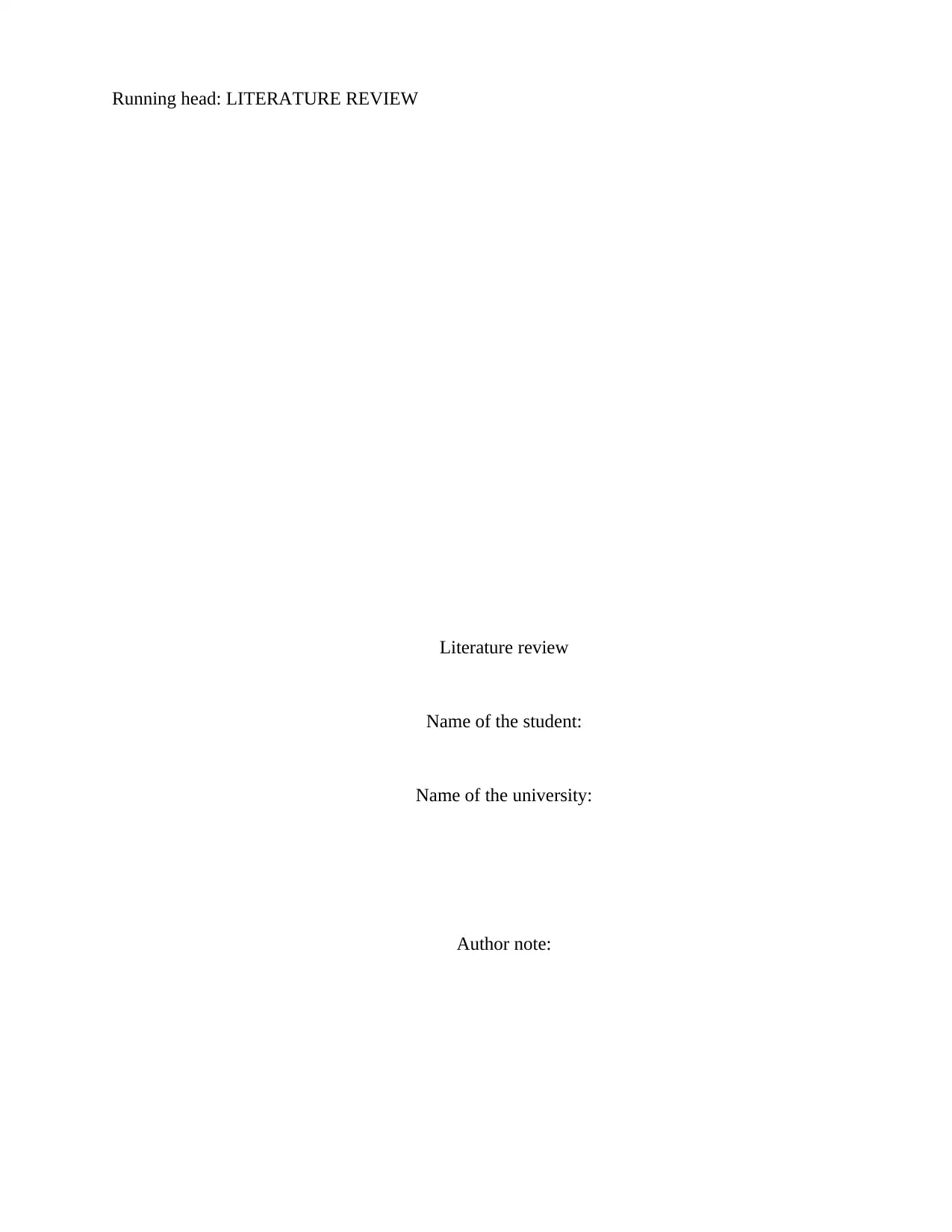
Running head: LITERATURE REVIEW
Literature review
Name of the student:
Name of the university:
Author note:
Literature review
Name of the student:
Name of the university:
Author note:
Paraphrase This Document
Need a fresh take? Get an instant paraphrase of this document with our AI Paraphraser
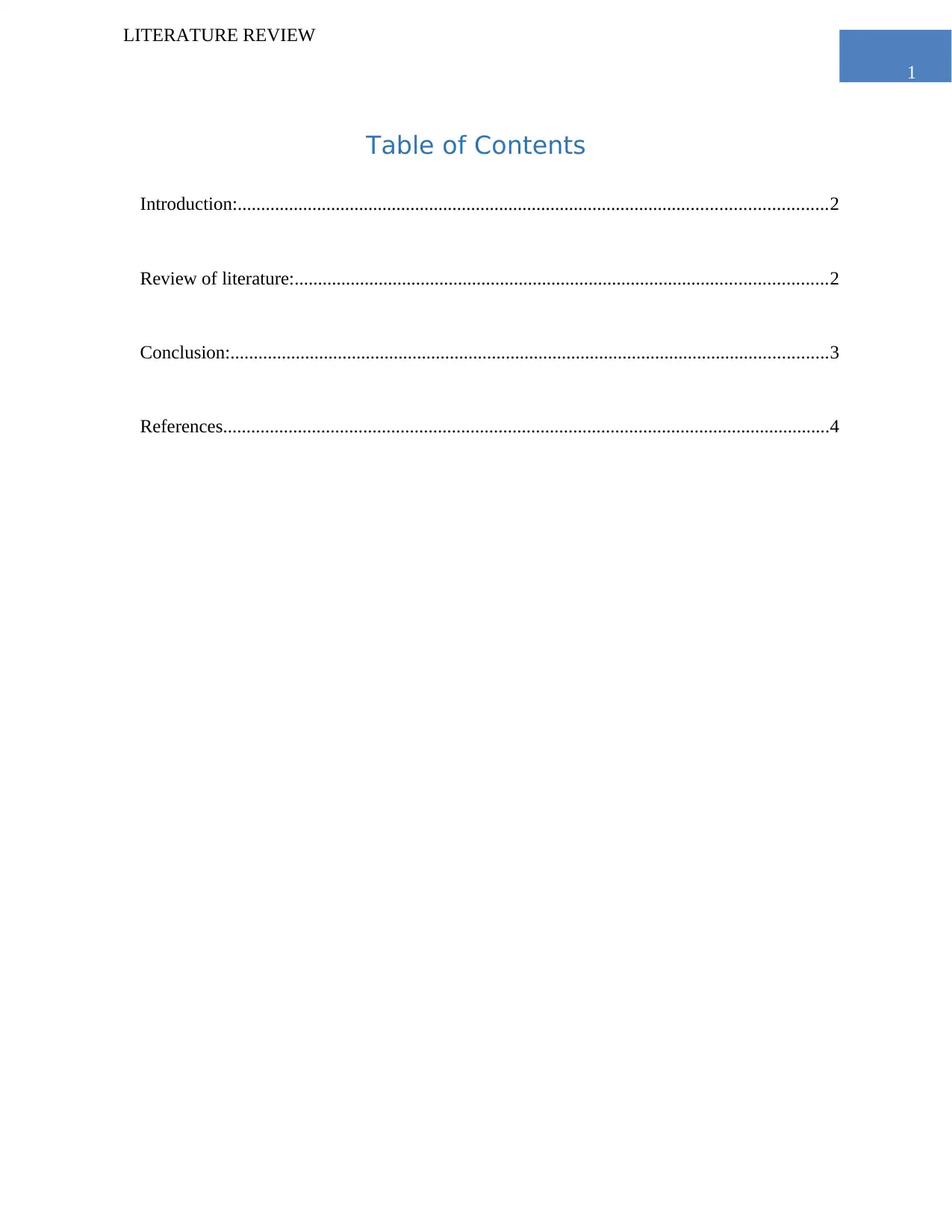
1
LITERATURE REVIEW
Table of Contents
Introduction:..............................................................................................................................2
Review of literature:..................................................................................................................2
Conclusion:................................................................................................................................3
References..................................................................................................................................4
LITERATURE REVIEW
Table of Contents
Introduction:..............................................................................................................................2
Review of literature:..................................................................................................................2
Conclusion:................................................................................................................................3
References..................................................................................................................................4
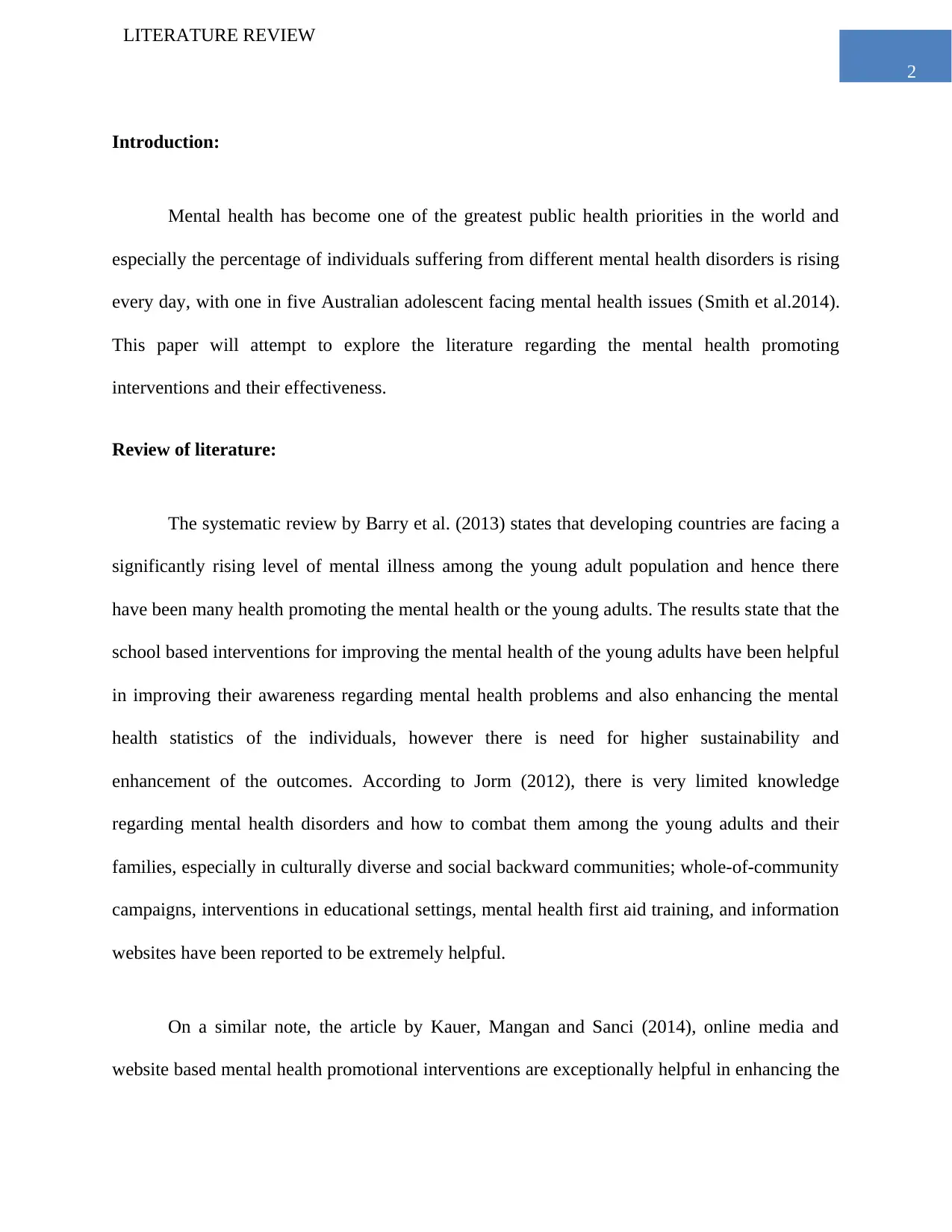
2
LITERATURE REVIEW
Introduction:
Mental health has become one of the greatest public health priorities in the world and
especially the percentage of individuals suffering from different mental health disorders is rising
every day, with one in five Australian adolescent facing mental health issues (Smith et al.2014).
This paper will attempt to explore the literature regarding the mental health promoting
interventions and their effectiveness.
Review of literature:
The systematic review by Barry et al. (2013) states that developing countries are facing a
significantly rising level of mental illness among the young adult population and hence there
have been many health promoting the mental health or the young adults. The results state that the
school based interventions for improving the mental health of the young adults have been helpful
in improving their awareness regarding mental health problems and also enhancing the mental
health statistics of the individuals, however there is need for higher sustainability and
enhancement of the outcomes. According to Jorm (2012), there is very limited knowledge
regarding mental health disorders and how to combat them among the young adults and their
families, especially in culturally diverse and social backward communities; whole-of-community
campaigns, interventions in educational settings, mental health first aid training, and information
websites have been reported to be extremely helpful.
On a similar note, the article by Kauer, Mangan and Sanci (2014), online media and
website based mental health promotional interventions are exceptionally helpful in enhancing the
LITERATURE REVIEW
Introduction:
Mental health has become one of the greatest public health priorities in the world and
especially the percentage of individuals suffering from different mental health disorders is rising
every day, with one in five Australian adolescent facing mental health issues (Smith et al.2014).
This paper will attempt to explore the literature regarding the mental health promoting
interventions and their effectiveness.
Review of literature:
The systematic review by Barry et al. (2013) states that developing countries are facing a
significantly rising level of mental illness among the young adult population and hence there
have been many health promoting the mental health or the young adults. The results state that the
school based interventions for improving the mental health of the young adults have been helpful
in improving their awareness regarding mental health problems and also enhancing the mental
health statistics of the individuals, however there is need for higher sustainability and
enhancement of the outcomes. According to Jorm (2012), there is very limited knowledge
regarding mental health disorders and how to combat them among the young adults and their
families, especially in culturally diverse and social backward communities; whole-of-community
campaigns, interventions in educational settings, mental health first aid training, and information
websites have been reported to be extremely helpful.
On a similar note, the article by Kauer, Mangan and Sanci (2014), online media and
website based mental health promotional interventions are exceptionally helpful in enhancing the
⊘ This is a preview!⊘
Do you want full access?
Subscribe today to unlock all pages.

Trusted by 1+ million students worldwide
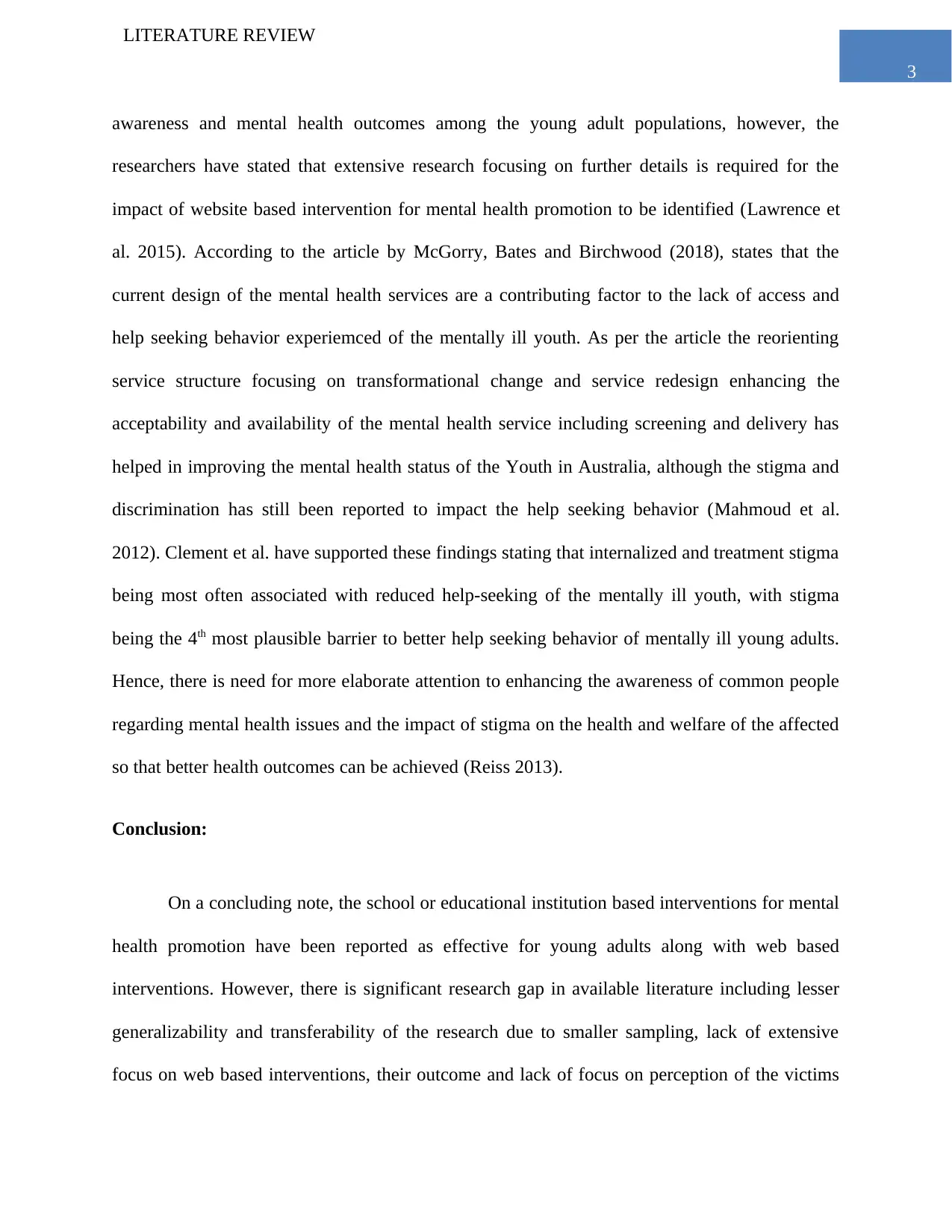
3
LITERATURE REVIEW
awareness and mental health outcomes among the young adult populations, however, the
researchers have stated that extensive research focusing on further details is required for the
impact of website based intervention for mental health promotion to be identified (Lawrence et
al. 2015). According to the article by McGorry, Bates and Birchwood (2018), states that the
current design of the mental health services are a contributing factor to the lack of access and
help seeking behavior experiemced of the mentally ill youth. As per the article the reorienting
service structure focusing on transformational change and service redesign enhancing the
acceptability and availability of the mental health service including screening and delivery has
helped in improving the mental health status of the Youth in Australia, although the stigma and
discrimination has still been reported to impact the help seeking behavior (Mahmoud et al.
2012). Clement et al. have supported these findings stating that internalized and treatment stigma
being most often associated with reduced help-seeking of the mentally ill youth, with stigma
being the 4th most plausible barrier to better help seeking behavior of mentally ill young adults.
Hence, there is need for more elaborate attention to enhancing the awareness of common people
regarding mental health issues and the impact of stigma on the health and welfare of the affected
so that better health outcomes can be achieved (Reiss 2013).
Conclusion:
On a concluding note, the school or educational institution based interventions for mental
health promotion have been reported as effective for young adults along with web based
interventions. However, there is significant research gap in available literature including lesser
generalizability and transferability of the research due to smaller sampling, lack of extensive
focus on web based interventions, their outcome and lack of focus on perception of the victims
LITERATURE REVIEW
awareness and mental health outcomes among the young adult populations, however, the
researchers have stated that extensive research focusing on further details is required for the
impact of website based intervention for mental health promotion to be identified (Lawrence et
al. 2015). According to the article by McGorry, Bates and Birchwood (2018), states that the
current design of the mental health services are a contributing factor to the lack of access and
help seeking behavior experiemced of the mentally ill youth. As per the article the reorienting
service structure focusing on transformational change and service redesign enhancing the
acceptability and availability of the mental health service including screening and delivery has
helped in improving the mental health status of the Youth in Australia, although the stigma and
discrimination has still been reported to impact the help seeking behavior (Mahmoud et al.
2012). Clement et al. have supported these findings stating that internalized and treatment stigma
being most often associated with reduced help-seeking of the mentally ill youth, with stigma
being the 4th most plausible barrier to better help seeking behavior of mentally ill young adults.
Hence, there is need for more elaborate attention to enhancing the awareness of common people
regarding mental health issues and the impact of stigma on the health and welfare of the affected
so that better health outcomes can be achieved (Reiss 2013).
Conclusion:
On a concluding note, the school or educational institution based interventions for mental
health promotion have been reported as effective for young adults along with web based
interventions. However, there is significant research gap in available literature including lesser
generalizability and transferability of the research due to smaller sampling, lack of extensive
focus on web based interventions, their outcome and lack of focus on perception of the victims
Paraphrase This Document
Need a fresh take? Get an instant paraphrase of this document with our AI Paraphraser
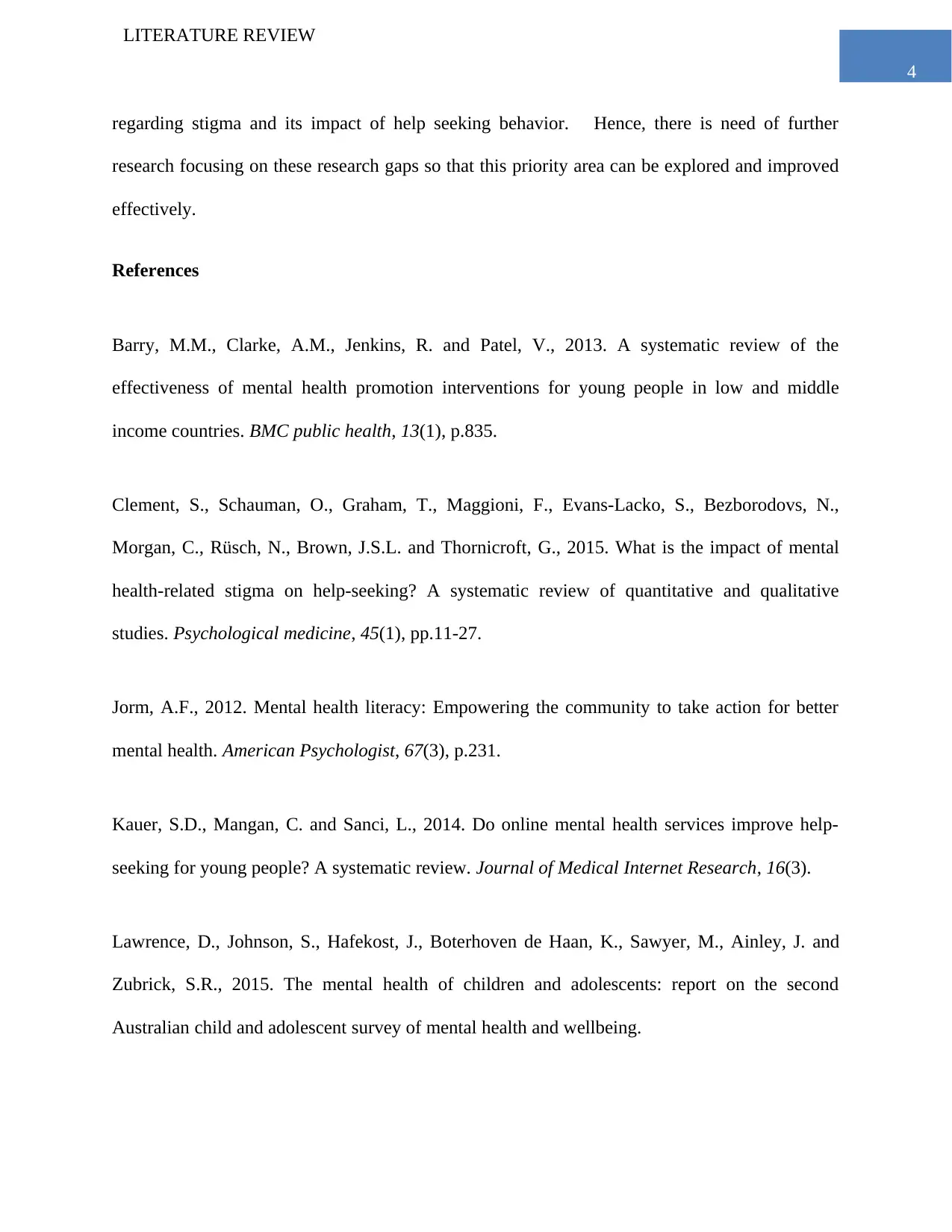
4
LITERATURE REVIEW
regarding stigma and its impact of help seeking behavior. Hence, there is need of further
research focusing on these research gaps so that this priority area can be explored and improved
effectively.
References
Barry, M.M., Clarke, A.M., Jenkins, R. and Patel, V., 2013. A systematic review of the
effectiveness of mental health promotion interventions for young people in low and middle
income countries. BMC public health, 13(1), p.835.
Clement, S., Schauman, O., Graham, T., Maggioni, F., Evans-Lacko, S., Bezborodovs, N.,
Morgan, C., Rüsch, N., Brown, J.S.L. and Thornicroft, G., 2015. What is the impact of mental
health-related stigma on help-seeking? A systematic review of quantitative and qualitative
studies. Psychological medicine, 45(1), pp.11-27.
Jorm, A.F., 2012. Mental health literacy: Empowering the community to take action for better
mental health. American Psychologist, 67(3), p.231.
Kauer, S.D., Mangan, C. and Sanci, L., 2014. Do online mental health services improve help-
seeking for young people? A systematic review. Journal of Medical Internet Research, 16(3).
Lawrence, D., Johnson, S., Hafekost, J., Boterhoven de Haan, K., Sawyer, M., Ainley, J. and
Zubrick, S.R., 2015. The mental health of children and adolescents: report on the second
Australian child and adolescent survey of mental health and wellbeing.
LITERATURE REVIEW
regarding stigma and its impact of help seeking behavior. Hence, there is need of further
research focusing on these research gaps so that this priority area can be explored and improved
effectively.
References
Barry, M.M., Clarke, A.M., Jenkins, R. and Patel, V., 2013. A systematic review of the
effectiveness of mental health promotion interventions for young people in low and middle
income countries. BMC public health, 13(1), p.835.
Clement, S., Schauman, O., Graham, T., Maggioni, F., Evans-Lacko, S., Bezborodovs, N.,
Morgan, C., Rüsch, N., Brown, J.S.L. and Thornicroft, G., 2015. What is the impact of mental
health-related stigma on help-seeking? A systematic review of quantitative and qualitative
studies. Psychological medicine, 45(1), pp.11-27.
Jorm, A.F., 2012. Mental health literacy: Empowering the community to take action for better
mental health. American Psychologist, 67(3), p.231.
Kauer, S.D., Mangan, C. and Sanci, L., 2014. Do online mental health services improve help-
seeking for young people? A systematic review. Journal of Medical Internet Research, 16(3).
Lawrence, D., Johnson, S., Hafekost, J., Boterhoven de Haan, K., Sawyer, M., Ainley, J. and
Zubrick, S.R., 2015. The mental health of children and adolescents: report on the second
Australian child and adolescent survey of mental health and wellbeing.
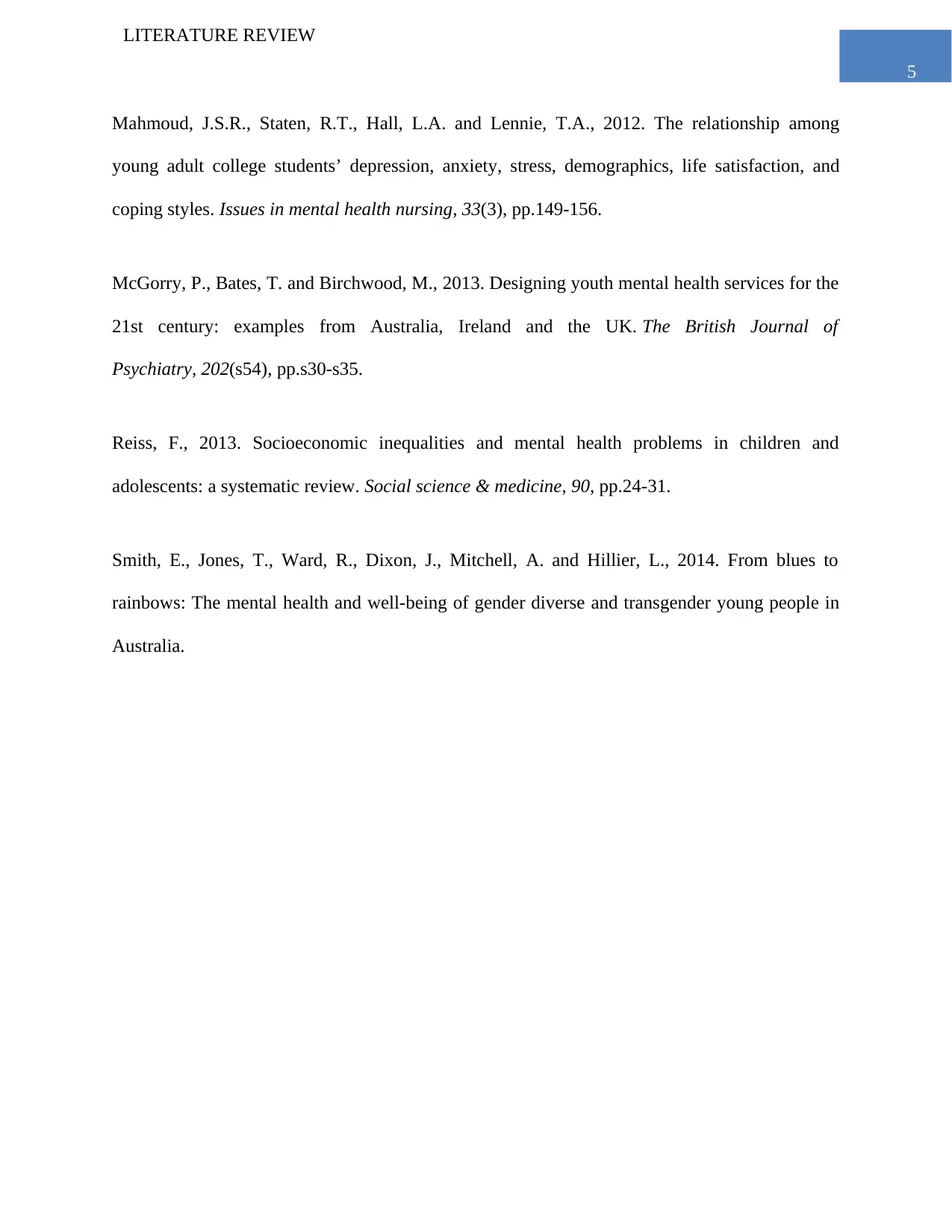
5
LITERATURE REVIEW
Mahmoud, J.S.R., Staten, R.T., Hall, L.A. and Lennie, T.A., 2012. The relationship among
young adult college students’ depression, anxiety, stress, demographics, life satisfaction, and
coping styles. Issues in mental health nursing, 33(3), pp.149-156.
McGorry, P., Bates, T. and Birchwood, M., 2013. Designing youth mental health services for the
21st century: examples from Australia, Ireland and the UK. The British Journal of
Psychiatry, 202(s54), pp.s30-s35.
Reiss, F., 2013. Socioeconomic inequalities and mental health problems in children and
adolescents: a systematic review. Social science & medicine, 90, pp.24-31.
Smith, E., Jones, T., Ward, R., Dixon, J., Mitchell, A. and Hillier, L., 2014. From blues to
rainbows: The mental health and well-being of gender diverse and transgender young people in
Australia.
LITERATURE REVIEW
Mahmoud, J.S.R., Staten, R.T., Hall, L.A. and Lennie, T.A., 2012. The relationship among
young adult college students’ depression, anxiety, stress, demographics, life satisfaction, and
coping styles. Issues in mental health nursing, 33(3), pp.149-156.
McGorry, P., Bates, T. and Birchwood, M., 2013. Designing youth mental health services for the
21st century: examples from Australia, Ireland and the UK. The British Journal of
Psychiatry, 202(s54), pp.s30-s35.
Reiss, F., 2013. Socioeconomic inequalities and mental health problems in children and
adolescents: a systematic review. Social science & medicine, 90, pp.24-31.
Smith, E., Jones, T., Ward, R., Dixon, J., Mitchell, A. and Hillier, L., 2014. From blues to
rainbows: The mental health and well-being of gender diverse and transgender young people in
Australia.
⊘ This is a preview!⊘
Do you want full access?
Subscribe today to unlock all pages.

Trusted by 1+ million students worldwide
1 out of 6
Related Documents
Your All-in-One AI-Powered Toolkit for Academic Success.
+13062052269
info@desklib.com
Available 24*7 on WhatsApp / Email
![[object Object]](/_next/static/media/star-bottom.7253800d.svg)
Unlock your academic potential
Copyright © 2020–2026 A2Z Services. All Rights Reserved. Developed and managed by ZUCOL.





